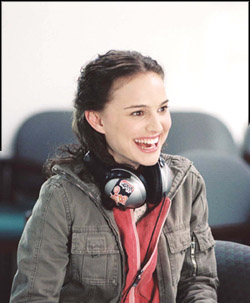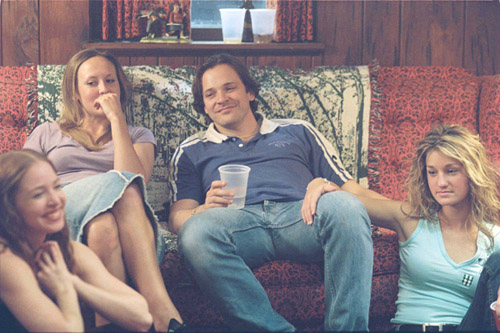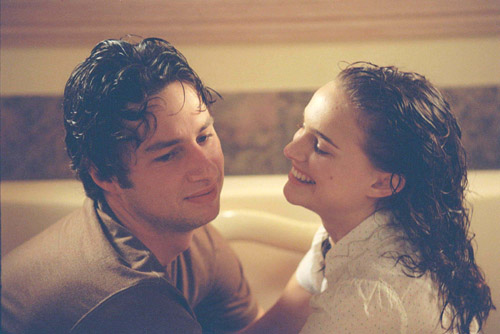Like his character, Andrew Largeman, Braff was
born and raised in Essex County, New Jersey, a part of America that already
looms large in our cultural landscape. Philip Roth, one of our most prolific
authors, often refers to himself as a “Newark Jew,” and he’s made Newark
and her suburbs the home turf of his fictional alter ego Nathan Zuckerman.
Tony Soprano is also a resident of Essex County, and every episode of HBO’s
popular series THE SOPRANOS finds him driving from working class streets in
Bloomfield to manicured lawns in Livingston and everywhere else in between.
Along comes Braff to show us the hidden depths of Essex County, revealing
places on a map his own making that none of us has ever seen before.
When the film opens, Andrew is in Los Angeles. He wants to be an actor and he’s had some success, but he actually earns his living as a waiter. The L.A. sequences, though brief, are perceptive and quite funny. We know right away that Andrew is in alien territory, and the only thing sustaining him is his appreciation of the absurd. (No, he can’t bring the bread right away. Doesn’t the “starving” starlet realize there’s no bread in a Vietnamese restaurant?)
Soon enough the phone rings, and Andrew can no longer ignore his roots. His mother is dead. Andrew is Jewish. He must take the first possible flight east so that his family can proceed with her funeral.
High above the flyover zone, the plane begins to shudder and shake. Not to worry, it’s just Andrew, having a panic attack. Does this sound like a Woody Allen movie? For Braff, the link isn’t just cultural, it’s also biographical. Braff made his screen debut in 1993, playing Nick Lipton, son of Carol and Larry, in
MANHATTAN MURDER MYSTERY, the only film in which Diane Keaton and Woody Allen, as the Liptons, depicted themselves as parents. That indisputable factoid liberates Braff creatively. He’s a young Jewish man who’s written and directed his first film, casting himself in the lead role, so he knows we’ll be looking for the Woody Allen influence on his work. The personal connection enables him to wink at us.
The day after the funeral Andrew meets someone who is sweet and pretty and more than a little ditzy. Is Sam Andrew’s
“ANNIE HALL”? Of course. She’s the woman who will fill the empty space in his head with music.
|

Natalie Portman, glowing with natural beauty,
fulfills her great potential in GARDEN STATE.
(Photo credit: K.C. Bailey)
|
What a great moment for the mishpokhe! Allen, like many Jewish men, has a thing for tall, blond shiksas. But Natalie Portman, the woman of Zach Braff’s dreams, once starred as Anne Frank on Broadway. The audience doesn’t need to know this to enjoy their unfolding relationship, but Braff and Portman both know it, and it gives extra texture to Andrew’s homecoming.
Portman’s STAR WARS adventures are cleverly mocked in the little movie Sam’s mother shows the first time Andrew visits. Take away the elaborate hair-dos and the ornate costumes and “Queen Amidala” looks like who she really is: a smart Jewish girl from Long Island.
GARDEN STATE’s third focal character is Mark, Andrew’s high school buddy. The years have not been kind to Mark. He works at a dead-end job, supplementing it with petty theft. Braff doesn’t make excuses for the downward spiral of Mark’s life, he just gives actor Peter Sarsgaard a noble gesture towards the end of the film that reveals Mark’s true self. There’s a specific object Mark wants Andrew to have, but before he can give it, Mark must admit that he knows where to find it. |
And so these three young people on the verge of adulthood stand side-by-side together on the edge of an abyss, and they scream into its black depths and draw courage from the combined energy of their collective voices. After years in a mental fog, lonely and withdrawn, Andrew has found both love and friendship.
Full disclosure: I was also born in Newark and raised in Essex County, and I know for a fact that this climactic scene occurs in a place that doesn’t actually exist. But Braff is so persuasive and the path to this particular location is so perfect, that it resonates like the Iowa cornfield in
FIELD OF DREAMS. Seek and thou shalt find. Places we think we know can still surprise us if we have sufficient faith to look deep.

Peter Sarsgaard gives another pitch-perfect performance in the role of Mark,
a man who has seemingly buried himself in a slacker lifestyle.
(Photo credit: K.C. Bailey)
Woody Allen has grown quarrelsome and cynical with age. His recent films are so ugly and misogynistic that they’re almost impossible to watch. Luckily he’s not Braff’s only hero. There’s also a lot of Hal Ashby in
GARDEN STATE. The people who love
HAROLD AND MAUDE will find some similarly quirky characters, like the guy in the ersatz knight costume. When we first meet Andrew he’s like Chance the Gardener, Peter Seller’s Oscar-nominated character from
BEING THERE, and even though the reasons for Andrew’s blank expression couldn’t be more different, he’s similarly misunderstood by most of the adults he encounters.
The Ashby influence softens GARDEN
STATE and gives it a humanistic glow that Allen could never conjure up even in his early years. With Sam and Mark to ground him, Andrew confronts his father (Ian Holm). He brings their “big secret” into the light, they hash it out, and the healing process begins. Like Dorothy in THE WIZARD OF OZ, Andrew has traveled far only to discover that there’s no place like home.

Some stories really do earn their happy endings!
(Photo credit: K.C. Bailey)
FINAL FF2
NOTE:
This article is a slightly expanded version
of the review originally published
in the August 2004 edition of the
WORLD JEWISH
DIGEST
(Volume 1 Number 11)
& is posted here with their permission.
For WJD subscription information:
Call 312.332.4172 extension 42
or
Fax 312.332.2119
